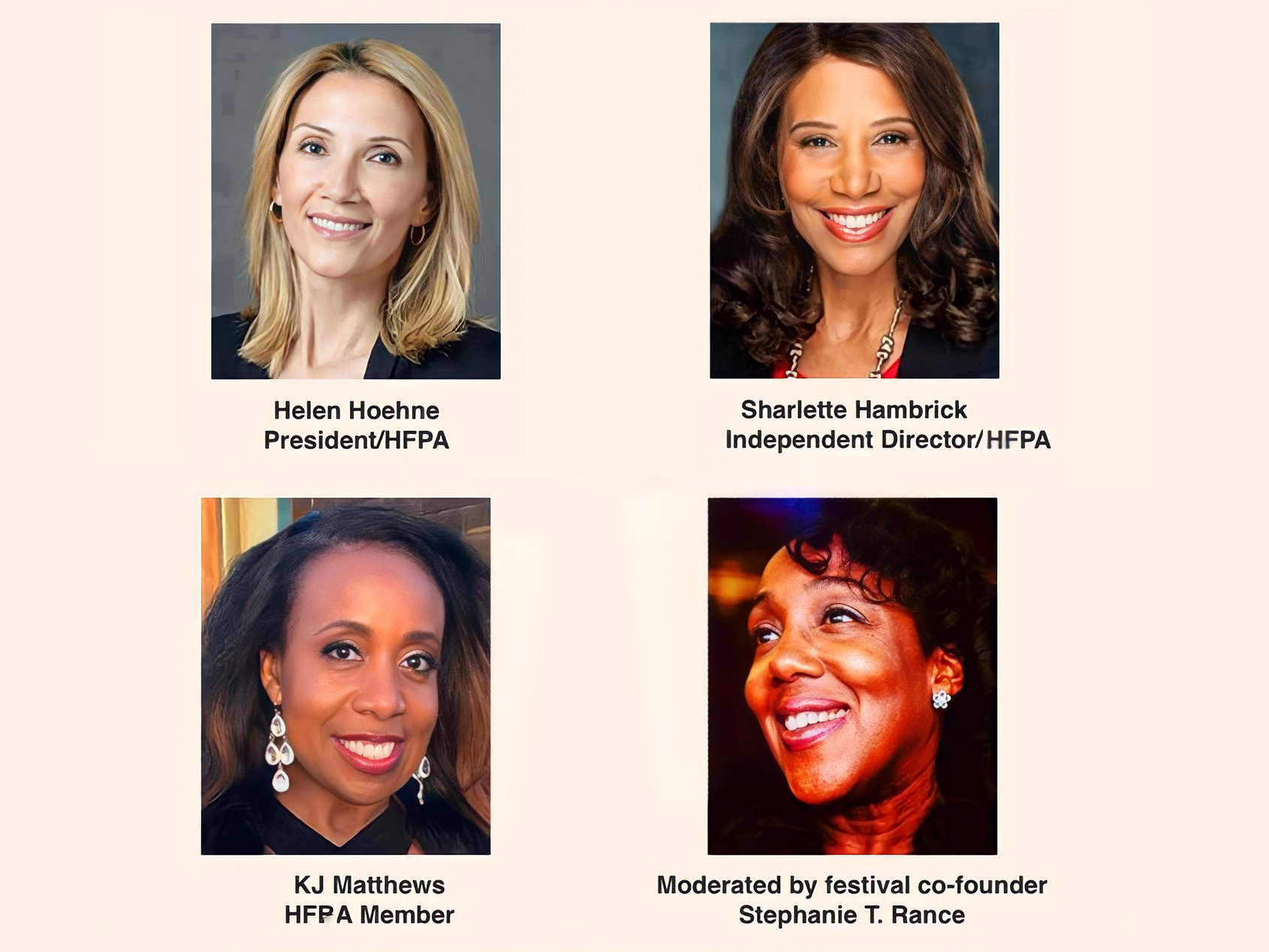
- HFPA
HFPA’s DEI Reform Efforts Discussed at Martha’s Vineyard African American Film Festival Panel
Representatives from the Hollywood Foreign Press Association led an informative panel at the Martha’s Vineyard African American Film Festival (MVAAFF) in Massachusetts earlier this week, where they discussed the organization’s recent reforms and Diversity, Equality and Inclusion (DEI) efforts.
The lively session was hosted by co-founder of the MVAAFF, Stephanie T. Rance, and featured a Q&A session with Helen Hoehne, President of the HFPA, Sharlette Hambrick, an Independent HFPA Board Director, and HFPA member, K.J. Matthews, during which the speakers outlined the comprehensive change that the Association has embraced over the past 18 months.
Rance called the discussion “serious” and deemed it “a necessary conversation.”
The HFPA is a proud sponsor of the 2022 Martha’s Vineyard African American Film Festival, which is a nine-day event for independent and well-established African American filmmakers to showcase, screen, and promote emerging feature, documentary, and short films from across the world.
During the enlightening panel symposium, the audience was updated on the efforts to promote diversity, equality, and inclusion throughout the HFPA. The attendees were also informed about how people of color are involved in every aspect of decision-making at the organization, from the membership level through to the Board.
Hoehne explained why the HFPA decided to participate in the Massachusetts event: “Diversity is not just a checkbox for us. It has become our mission and our culture.”
K.J. Mathews, who heads up the HFPA’s PR Committee, shared some of the reasons why she joined the association.
“I made the decision that, if the HFPA really wanted to bring about systemic change, then I wanted to be part of that,” she explained. “You can’t accomplish anything in Hollywood if all you’re doing is sitting on the outside complaining and looking in. As a member, I could be at the table helping to guide change.”
That belief was borne out when Matthews became one of several Black members admitted into the HFPA last year as part of the largest and most diverse class of new members in the history of the Association.
“I was immediately given a feeling of empowerment and leadership,” said the award-winning journalist. “I was made the head of one of the committees and had a lot of input right away. I like the fact that I have a voice in the way I guide our change – in a way that I never felt when I worked for other organizations and outlets.”
Matthews insisted, however, that she didn’t back down from the wide range of discussions held within the group of international journalists, which represents more than 55 countries.
“There are differences in perceptions due to cultural diversity,” she acknowledged. “But we work together and are committed to continuing the systemic changes we’ve already implemented.”
Independent Board member Sharlette Hambrick highlighted a new Code of Conduct for the membership, which has been implemented to ensure substantive changes during the HFPA’s press conferences.
Hoehne addressed how the Association is ensuring that the wrongs of the past will not be repeated.
“We have had a few members leave, who were inappropriate. We are cleaning up,” the HFPA President explained. “I believe the things that happened in the past couldn’t happen anymore because we have such a strict Code of Conduct in place. If anyone behaved that way now they would not be a member of the organization anymore.”
The speakers confirmed several changes that have been initiated in recent months, including the addition of mandatory DEI and sensitivity training, as well as the implementation of a complaints hotline and the aforementioned Code of Conduct, which has to be signed by each member of the HFPA.
“We’ve been through several sessions with our Chief Diversity Officer, Neil Phillips,” Hoehne said. “He not only taught us about DEI but also about sensitivity and how to ask questions. Coming from so many different cultures, English is not the first language for many of our members. Some members possibly weren’t aware of the impact of their questions.”
“This is not an excuse,” she added. “This is part of the learning process. This is what our members are going through. We are doing the work. Going through all of this training to make us better.”
Hoehne highlighted the positives, including the history of the awards program in discovering and elevating new talent.
“When it comes to the Golden Globes, we’ve always awarded Black talent,” explained Hoehne. “We nominated and had winners the Academy never recognized, or didn’t even nominate. I am proud of the talent we have recognized. I’m not saying it stops there. We want to go further and do as much as we can to support representation.”
The President of the HFPA highlighted measurable and fundamental changes already implemented, including: “Our governance, by-laws, and now three Black members on our Board of Directors. Before we had zero. All of these things are measurable, but what is not measurable is the culture change. That’s what we really have to focus on. That’s what will also inspire Hollywood to change. We don’t want to just change ourselves but inspire the entire industry.”
“That’s why we started [an initiative] with the NAACP,” Hoehne explained, alerting the audience of the joint commitment to the Reimagine Coalition. “We have 16 organizations in the coalition and it’s all about inspiring change in Hollywood. Culture change is something we all have to work on together. We have to do this in unity.”
In addition to the work being done with the NAACP, the HFPA recently launched a partnership with the World Bank to bring international development partners together with Hollywood creative talent to develop educational entertainment content in local languages. This content can help change and shape mindsets about pressing global issues such as climate change, poverty and hunger, women and gender rights, and education issues.

